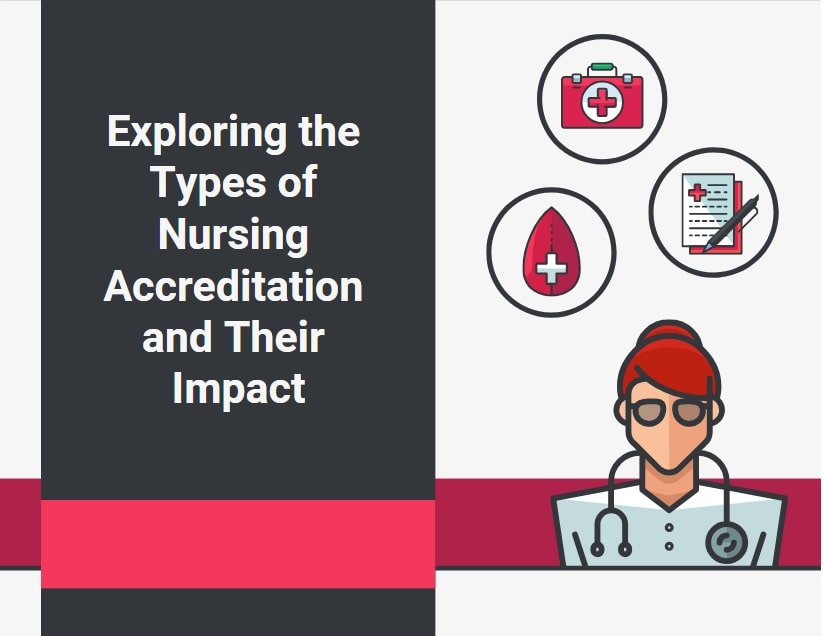Exploring the Types of Nursing Accreditation and Their Impact on Career Advancement
Now is a great time to be interested in a nursing degree. The demand for nursing leadership positions is already high, but is expected to keep growing through the next decade. Before deciding on where and what program or school to enroll in, however, it is important to take the time to accurately research the accreditation of various programs and how that accreditation affects nursing career path options. This article will consider what accreditation is in a nursing program and Types of Nursing Accreditation. Why that is important to the educational path that may be good. And then explore several types of nursing accreditations as they may impact future career advancement.
Table of Contents
The Basics of Nursing Accreditation
As with all types of accredited schools, programs, and institutions, the granting of that title only after having gone through the necessary peer reviews by authority organizations. These accreditation processes take the time to consider and vet out a program’s legitimacy. As it relates to its ability to properly equip students for the roles they may seek post-graduation. Not only does it hold the institution to high standards for the sake of the prospective students. But it holds students accountable for the sake of the health and safety of all those persons that may be served in a medical capacity.
The accreditation peer reviews see to it that students can prepare, take— and pass— the RN exams that preclude the ability to practice as a nurse.
Additionally, accreditation processes of nursing school are a marker of trustworthiness and legitimacy that can be recognized and trusted not just by prospective students. But by financial institutions that are backing those students. Any school or program that operates at a less than appropriate standard risks putting those hopeful graduates at a variety of disadvantages.
Disadvantages of Unaccredited Nursing Programs
First, if a program cannot properly equip students with the real-world experience they need and the knowledge it takes to pass the exams, they may not get hired. If unable to get hired, they won’t be able to pay back their loans and that hurts the lender.
Secondly, even if a program can prepare a student enough with rote memorization techniques in order to pass the exams, when they get out into the field those new nurses have to start demonstrating their hands-on knowledge. There is a big difference. Especially in life or death roles and situations like health care. between having information in one’s head and actual knowledge by which to do the job well.
There have been instances where programs have trained multiple years’ worth of graduates who then, after being fired, are proven to have been less than well trained. That lack of good, sound training affects the medical offices’ reputations and their ability to keep patients healthy.
Third, depending on the program and the accreditation of each program, a graduate may be limited by the regulations per state. Some accreditations do not transfer between states let alone different schools.
Finally, those people with a desire and dream to eventually teach need to be aware that most nursing educator positions and college teaching posts demand a degree from only accredited programs. While there are likely some posts availablet do not require a degree from an accredited institution, the odds are good that those same institutions are also not legitimate.
Thus, learning to teach in those positions brings all the previous points into play. And it is important to check their legitimacy.
Good Accreditation
A soundly accredited nursing school should be recognized by the United States Department of Education. The list of accredited schools can be found on the Departments of Educations online list. RN programs should be verified by organizations such as The Accreditation Commission for Education in Nursing (ACEN) or the Commission on Collegiate Nursing Education (CCNE).
Each of these organizations takes the time to consider a number of factors carefully and thoroughly in order for proper accreditation standards. Authorities look at the school’s curriculum, not just on paper. But take time to witness its being presented in classroom and lab work. Teachers’ qualifications, their study and work histories do also matter.
The pass rate of students taking the NCLEX-RN exam is deeply important. For if an unacceptable or concernable number of students are regularly not passing these tests, then it is a clear sign that a program is severely lacking.
In order to maintain these standards schools must complete and maintain accreditation standards as met by regular review. This keeps administrators, teachers, and the curriculum development a forefront focus on the direction and future formation of programming.
There are different standards depending on the organization. These do the reviewing and the length of time that those accreditations last changes accordingly. Each organization sets its own year marks and standards. And the reviewal standards and processes can vary.
How to Verify Accreditation
Since there are so many consequences for future career opportunities depending on the accreditation of whatever programming is, it is vital that prospective students know how to verify a school accreditation. Some good ways to do this are to do some of the following.
- Begin by reviewing a school’s website or promotional material such as a brochure.
- Directly contact and speak with hospitals and clinics that may be able to secondarily verify and vouch for the worthiness of various programs.
- Use online search tools to sort through baccalaureate and graduate programs for nursing.
- Go directly to the Accreditation Commission for Education in Nursing or the Commission on Collegiate Nursing Education to see the lists of acceptable institutions.
What are the Main Accreditation Boards for Nursing?
The main accreditation boards for nursing in the United States are the Accreditation Commission for Education in Nursing (ACEN) and the Commission on Collegiate Nursing Education (CCNE). ACEN accredits nursing education programs at all levels, while CCNE focuses on accrediting baccalaureate and graduate nursing programs. These boards ensure that nursing programs meet rigorous standards of quality and prepare students for successful careers in nursing.
What is the difference between CNEA and ACEN?
CNEA (Commission for Nursing Education Accreditation) is a subsidiary of the National League for Nursing (NLN) and accredits nursing education programs. ACEN (Accreditation Commission for Education in Nursing) is a separate accrediting body that evaluates nursing education nursing school programs independently. While both organizations assess the quality of nursing programs, they have different structures and processes for accreditation.
Irwin Michael Reston is an expert who has more than 30 years of experience in optimizing businesses, inspiring individuals and improving human resources departments. He established the BlueLight Consulting Limited to provide learning and training service worldwide.










